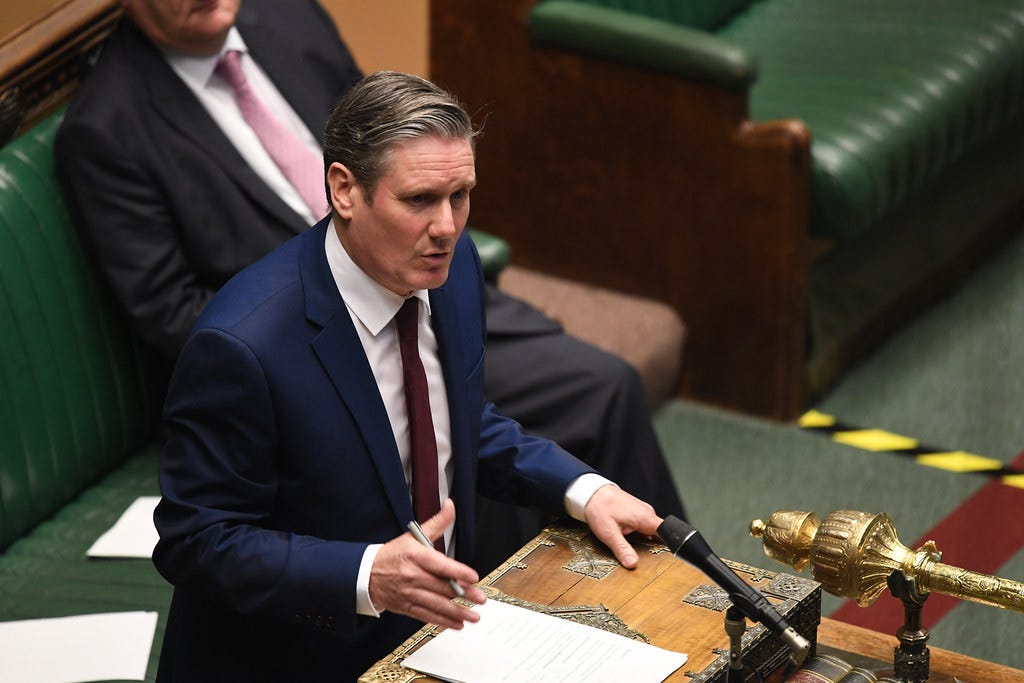The Pundits Are Wrong: Voters Understand Keir Starmer Perfectly
Voters see Starmer as dishonest and evasive. Who can blame them?
A common theme in pundit scrawls on Keir Starmer is that voters still don’t know what the man “stands for”. Despite countless rebrands, a Fabian Society essay, two Labour conferences and an astonishingly easy ride from the media until the last couple of months, in the eyes of the electorate Starmer is one big question mark.
Policy-wise, this is half-true. Starmer appears to have barely any interest in policy or policymaking, which Labour insiders recently corroborated to the Guardian’s Jessica Elgot. On economics, Starmer is especially hopeless: at no point during his two years of leadership has he shown even a cursory understanding of any economic issue – not even on the absolute basics one should expect from a politician of the left, for example wealth and income inequality.
Sympathetic commentators give similar justifications for his reticence: Labour still has a “brand problem”; Starmer is still distancing himself and Labour from the Corbyn years; there’s no point announcing policies two years before an election. But the best way for Starmer to “fix Labour’s brand” and throw the Corbyn years in the bin would be to show voters his project. Beyond slogans, platitudes and the odd flagship policy (the latest of which has been taken by the Tories, leaving Labour’s cupboard bare), he still hasn’t done that.
The full truth is this: no one knows what Starmer stands for because he doesn’t stand for anything. The man has no ideology of which to speak, bar a strong preference for authoritarian approaches to criminal justice and social issues informed by his legal career. What else does he care about? What materially important issues ignites his passions? He gives the spiel at the dispatch box and in media interviews, but none of it seems real. Even reading his jubilee tribute to the Queen a couple of weeks ago, you just don’t buy it. It isn’t that the Labour leader simply hasn’t come out of his shell yet – he has. The problem is that there’s nothing there.
In that context, Starmer’s recent efforts to rebrand once more, this time as an institutionalist, go from implausible to nauseatingly cynical. The premise is this: Johnson has absolutely no respect for Britain’s democratic institutions, checks and balances, the standards traditionally expected of public officials, or even the laws his own government make, and Starmer would restore and uphold those standards as prime minister. It’s a defensible angle because voters are rightly furious about Johnson’s flippancy. It gives the opposition chance to put clear water between itself and the Tories.
On paper, then, a good game plan. But there’s a catch: you can’t pitch yourself as the candidate of integrity and honesty if you regularly behave in a questionable or dishonest way. There’s an argument to be made that Starmer’s initial evasiveness on the beergate story helped inflate a rather trivial matter to the status of full-blown scandal, undermining months of Labour attacks on Johnson and the government for ‘partygate’. Now, Starmer is under investigation by the Parliamentary Commissioner for Standards for failing to declare in time financial interests including more than £2,000 worth of free tickets to Premier League matches from earlier this year. Amid a cost-of-living crisis, this looks out-of-touch – but just look how guilty he looks in this clip, as well.
No wonder, then, that public sentiment towards the Labour leader appears to be enormously negative. A JL Partners survey of 2,000 people commissioned by the Sun found 50% of respondents had a negative opinion of him, with 24% neutral and 26% positive. Focus groups describe Starmer as “weak”, a “people pleaser” with “no vision”, and even less equivocally, a “slippery slimeball”. An Opinium poll in the Observer this Sunday found more people thought Johnson a better choice for prime minister than Starmer. Against a prime minister as morally abject as the one we have, that is an atrocious position to be in.
Thus, the problem isn’t that Starmer is an unknown quantity. Voters understand him perfectly, and they do not like what they see. Really, who can blame them? He doesn’t seem to care about any issues, is absolutely content with lying in order to further his career, has no problems setting principles and immediately abandoning them, believes the rules (and law, should Durham Police fine him for beergate) don’t apply to him, and appears to want to be prime minister for the sake of being prime minister. Sounds familiar, doesn’t it?

